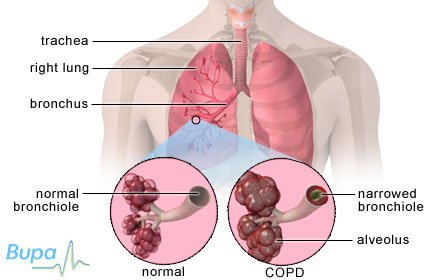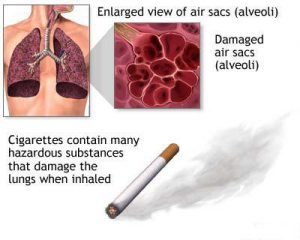Chronic Obstructive Pulmonary Disease (COPD)
COPD refers to a group of lung diseases that block airflow and make breathing difficult. Emphysema and chronic bronchitis are the two most common conditions that make up COPD.

Emphysema occurs when the air sacs at the end of the smallest air passages in the lungs are gradually destroyed. Chronic bronchitis is a swelling in the lining of your bronchial tubes. The bronchial tubes carry air to and from your lungs. COPD symptoms normally don’t appear until significant lung damage has occurred, and the symptoms get worse over time. People with COPD have periods of time when their symptoms become worse and persist for days or even longer.
Common symptoms of COPD include:
- Shortness of breath, especially during physical activities
- Wheezing
- Chest tightness
- Having to clear your throat right after getting up in the morning because of mucus in your lungs
- Chronic cough
- Blueness in the lips or in the fingernail beds
- Frequent respiratory infections
- Lack of energy
- Unintended weight loss
If you are suffering with COPD, you will want an experienced social security disability attorney in Wilmington to help you navigate the complexities of your case. Lung function tests are the key to presenting a good case to the Social Security Administration. These tests measure the amount of air in your lungs and the speed at which air moves in and out. Spirometry is the main test focused on by the Social Security Administration. A recent pulmonary function study such as spirometry will go a long ways in proving disability. Usually if a person can only walk a short distance before getting shortness of breath, this is a sign of severe COPD. The use of a home misting machine and the use of Prednisone are also strong evidence of COPD. You should take your misting machine and/or Prednisone to the hearing so that the judge can view them.
Obviously, smoking and COPD do not mix well together and the judge will likely frown upon such behavior. Generally, physicians will say that the smoking will cause COPD to worsen, but that  stopping smoking will not make the person less disabled. If you are still smoking at the time of your hearing, it would be helpful to be able to tell the judge that you have cut down on the smoking each day. So if you have COPD and you are smoking – stop smoking or at least put forth a good effort at trying to cut back.
stopping smoking will not make the person less disabled. If you are still smoking at the time of your hearing, it would be helpful to be able to tell the judge that you have cut down on the smoking each day. So if you have COPD and you are smoking – stop smoking or at least put forth a good effort at trying to cut back.
Doctors rate cases of COPD by using the Global Initiative for Chronic Obstructive Lung Disease (GOLD) depending on lung function test results:
| Stage I: Mild COPD | mild airflow limitation, FEV 1 >=80% predicted; sometimes, but not always, there is a chronic cough and sputum; at this stage, you may not know that your lung function is abnormal |
| Stage II: Moderate COPD | Worsening airflow limitation, 50% < =FEV 1 < 80% predicted; shortness of breath typically developing on exertion; This is the state at which patients typically seek medical attention because of chronic respiratory symptoms or an exacerbation of their disease |
| Stage III: Severe COPD | Further worsening of airflow limitation, 30%<=FEV1 < 50% predicted; greater shortness of breath, reduced ability to exercise, and repeated exacerbations having an impact on the quality of life |
| Stage IV: Very Severe COPD | Severe airflow limitation, FEV1 < 30% predicted; chronic respiratory failure; quality of life is very impaired and exacerbations may be life-threatening |
The inability to tolerate exposure to dust, smoke, or fumes must be covered in the case presentation to the judge. Any prior work that involved these exposures must be explained to the judge.
What Our Clients Say:
Member:

Attorney Gregory Kornegay
Greg is a trial attorney in Wilmington with over 30 years of experience. Greg was born and raised in southeastern North Carolina. Before law school he managed a store with employees making a payroll every week. His first job out of law school was as an Assistant District Attorney investigating and trying cases for the State of North Carolina. Through the years he has handled many different types of cases – including death penalty cases.
Being married with children has been a blessing and a challenge, but has served him well in understanding the problems individuals and families face as they live out their lives. Greg believes that each case is different and the needs of each client are unique, but there are certain themes of life that we all share.


